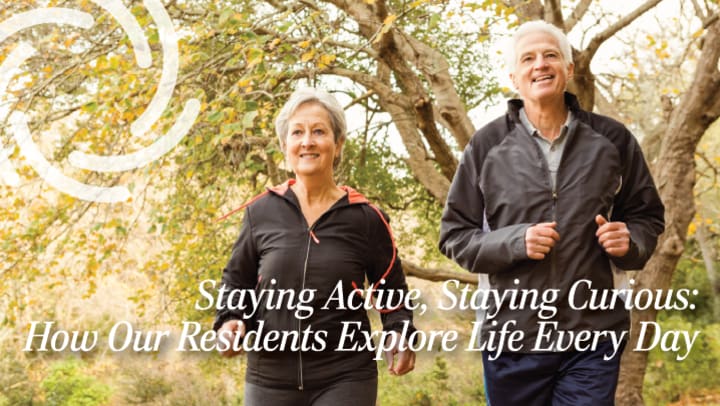Aging is a natural part of life, but how we experience it can look very different from one person to the next. Some people find themselves slowing down, while others discover new passions, interests, and energy well into their later years. The difference often comes down to two powerful habits: staying active and staying curious.
Both the body and the mind benefit when we keep moving, exploring, and learning. In fact, research consistently shows that physical activity and mental engagement play essential roles in maintaining health, independence, and quality of life as we age.
Why Staying Active Matters
Movement is medicine, and for older adults, it’s one of the best ways to support longevity and vitality. According to the Centers for Disease Control and Prevention (CDC), regular physical activity can reduce the risk of chronic illnesses such as heart disease, diabetes, and certain cancers. It also helps maintain mobility, balance, and bone strength—all crucial for reducing the risk of falls.
Even light or moderate activity makes a difference. Walking, gardening, chair yoga, or dancing to favorite music can all improve cardiovascular health and keep joints flexible. Beyond the physical benefits, activity can also boost mood by releasing endorphins, reducing stress, and improving sleep.
The Social Connection
Another overlooked aspect of physical activity is its role in social engagement. Joining a walking club, participating in group fitness classes, or even stretching with a friend creates opportunities for connection. These shared moments combat loneliness and isolation, which can impact health as much as smoking or obesity. Socially active seniors report higher life satisfaction and lower rates of depression (AARP).
The Power of Curiosity
Curiosity is often described as the spark that keeps life interesting. For seniors, maintaining a sense of wonder and a willingness to learn not only enriches daily experiences but also supports cognitive health.
Studies from the National Institute on Aging highlight how mentally stimulating activities—such as reading, puzzles, art, or learning a new skill—can help protect against cognitive decline. Curiosity also promotes resilience, encouraging seniors to adapt to change with a positive mindset rather than fear.
Curiosity doesn’t have to mean mastering a new language or taking on advanced courses—though it certainly can. It might be as simple as exploring a new hobby, attending a lecture at a local library, trying a new recipe, or asking questions about a grandchild’s latest passion. Every moment of curiosity keeps the brain engaged and the spirit uplifted.
The Link Between Activity and Curiosity
Staying active and staying curious are deeply interconnected. Physical activity often inspires curiosity, and curiosity often leads to activity. For example, someone who develops an interest in birdwatching might begin walking daily to observe different species. A passion for gardening may spark curiosity about soil science or botany.
Together, movement and curiosity create a cycle of growth that enriches body, mind, and spirit.
Simple Ways to Stay Active and Curious
-
Explore the Outdoors. Nature offers endless opportunities for movement and learning. Take walks in a local park, explore a botanical garden, or simply sit outside and observe the changing seasons. Curiosity can bloom in noticing bird calls, identifying flowers, or keeping a journal of outdoor discoveries.
-
Join a Group or Club. Senior centers, community organizations, and senior living communities often host book clubs, exercise classes, or hobby groups. These activities combine physical or mental engagement with the joy of social connection.
-
Take Advantage of Technology. Technology can open up a world of exploration. Virtual museum tours, online courses, video chats, and brain-training apps all keep curiosity alive. Fitness apps or virtual exercise classes can also encourage regular movement.
-
Try Something New Each Month. Make it a goal to try one new activity, recipe, or hobby each month. Whether it’s watercolor painting, chair yoga, or learning about a historical event, this steady stream of novelty fuels both activity and curiosity.
-
Volunteer and Give Back. Volunteering provides purpose while keeping both body and mind engaged. Whether tutoring children, helping at a food pantry, or knitting blankets for hospitals, volunteering fosters curiosity about others’ lives and keeps the body moving in meaningful ways.
Embracing Ageless Exploration
Aging doesn’t mean slowing down—it means redefining what it means to live fully. By staying active and staying curious, seniors can embrace what MBK Senior Living calls ageless exploration: the idea that life remains rich with possibility at every stage.
Staying active and curious is about making the years ahead meaningful, vibrant, and connected. Every walk taken, every question asked, every new skill tried is a step toward greater health and happiness.
For seniors, these habits are essential tools for living well. And for families and caregivers, encouraging loved ones to move, explore, and wonder is one of the greatest gifts we can give.
So, lace up your shoes, open a book, try something new, or ask a new question. The world is still waiting to be explored, no matter your age.
Ready to Explore More?
Staying active and staying curious are at the heart of living well at every age. At MBK Senior Living, our communities are designed to nurture both through vibrant programs, meaningful connections, and opportunities to keep exploring what brings joy.





